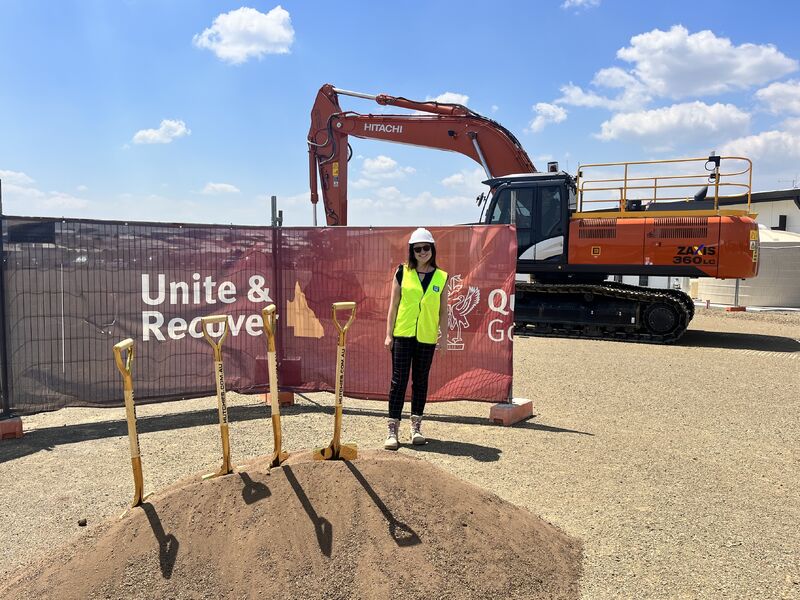Tamara Vaughan, Team Leader and Senior Project Manager at CPM, recently applied for the Infrastructure Association of Queensland scholarship. Her application gives an insight into her experience and insights into Queensland’s infrastructure future.
Who are you (introduce yourself) and what drives you to pursue a career in infrastructure?
I am a Project Management professional with a strong dedication to social infrastructure, particularly in the fields of health and transport.
My academic background includes an Honour’s degree in Project Management, and my career spans diverse industries including health, transport/rail, defence, and residential sectors.
Something that drives my passion for infrastructure is the challenge of intricately complex projects, and the opportunity to collaborate with other highly skilled professionals.
Most fundamentally, the sense of fulfilment that comes from contributing to crucial infrastructure projects that directly impact and improve the well-being of communities fuels my commitment to pursuing a rewarding career in this industry.
Broadly, what impact do you want to have on on Queensland and Australia’s infrastructure industry?
My vision for Queensland and Australia’s infrastructure industry is engrained in sustainability, resilience, and diversity.
In a world facing major climate shifts, it’s crucial that our infrastructure aligns with these changes. When we advance critical infrastructure, it’s vital to integrate future-proofing into our planning and design.
By adopting European sustainable building principles, Queensland and Australia can lead in sustainable infrastructure practices, reducing our ecological footprint and mitigating environmental impact.
Finally, I aspire to be a role model for women entering the infrastructure sector in Queensland by promoting diversity and inclusivity within the industry.
What personal and professional qualities that you possess make you a compelling candidate for the Scholarship?
My unwavering commitment to driving positive change in our industry makes me a strong candidate for the Scholarship.

I am a passionate advocate for challenging the status quo, and I actively empower my team to voice their opinions, fostering a culture of innovation and growth. This dedication to open dialogue is a key part of my leadership style and ensures that all project stakeholders, including team members and external contractors, have a voice and are actively engaged throughout the project lifecycle. This creates a positive work environment and consistently leads to better project outcomes.
I see synergy as central to project management and strive to harness it at every opportunity. Throughout my career, I have honed my skillset in managing diverse project teams and external contractors, aligning them to work harmoniously towards a shared objective.
Additionally, I am committed to continuously expanding my technical expertise. Access to these IAQ events, with the broad range of topics that they offer, provides an excellent opportunity for me to further my knowledge and connect with industry peers.
This scholarship would not only enhance my professional development but also allow me to contribute more effectively to our industry’s growth and innovation.
What are the greatest opportunities and challenges facing Queensland’s infrastructure industry as we transition to net-zero and build up to the 2032 Olympic and Paralympic Games?
Queensland’s infrastructure industry is at the cusp of an exciting yet challenging transformation as it aims for net-zero emissions and prepares for the 2032 Olympics. The state’s environmental advantages, sustainable infrastructure, AI integration, electrified transport, and skilled workforce all present unique opportunities and hurdles. Success during this transformative period will require investment, careful planning, and a commitment to sustainable, resilient, and inclusive development.
Queensland’s environmental conditions provide an exceptional opportunity for the growth of renewable energy. With its abundant sunshine and wind, Queensland is well-suited to harnessing clean, sustainable power. The government’s commitment to expanding the renewable sector further strengthens this potential, creating a strong foundation for a greener and more sustainable future.
As the state gears up to host the 2032 Olympics, building infrastructure that is not only state-of-the-art but also sustainable is crucial. These facilities should be designed to benefit communities long after the games conclude. Creating infrastructure that can provide lasting value, foster economic growth, and generate employment opportunities for Queenslanders is a significant opportunity in this transitional period.
Artificial Intelligence (AI) interfacing with infrastructure presents another exciting prospect. AI can optimise operations, enhance maintenance, and improve safety. However, it also brings the challenge of managing this technology efficiently to mitigate potential risks and job market disruptions. Ensuring responsible AI integration will be a vital aspect of Queensland’s infrastructure evolution.
Electrifying transport and establishing supporting infrastructure is essential for reducing greenhouse gas emissions. The challenge lies in securing investments from both public and private sectors and addressing the geographic constraints in a vast state like Queensland. Efficient charging infrastructure and network development must be integrated to make electric transport feasible.
A critical challenge, one that affects not only the transition to net-zero but infrastructure development in general, is the availability of skilled project and construction staff. Queensland’s ambitious infrastructure projects, from hospitals to public transport, will demand a substantial workforce. The current shortage of subcontractors for health and hospital projects at Queensland Health exemplifies this challenge.
Queensland’s future holds the promise of a greener, more efficient, and prosperous society, but it is essential to navigate our challenges with foresight and dedication.
Describe your vision for infrastructure in Queensland
My vision for infrastructure in Queensland is ambitious and forward-thinking, committed to creating centralised cities that are not only more efficient but also more sustainable and livable. This means designing cities to be denser and more walkable, emphasising mixed-use development to reduce the reliance on vehicles and promote vibrant communities.
We need to prioritise the seamless integration of existing cycling infrastructure to encourage sustainable transportation options such as bike riding, promoting healthier lifestyles, and reducing carbon emissions.
In pursuit of sustainability, investing in community gardens on rooftops and shared courtyards is key.
These green spaces will provide opportunities for learning and sustainable living while mitigating the urban heat island effect and enhancing flood resilience through public planting initiatives.
Developing dynamic public squares and plazas as multifunctional hubs for markets, festivals, concerts, or simply relaxation and socialisation will foster community and enrich our cities culturally.
I envision intergenerational housing and multi-generational centres to bridge generational gaps, reduce social isolation, and streamline infrastructure demands for childcare and aged care. These initiatives will create more inclusive and cohesive communities, allowing people of all ages to thrive together that comes from contributing to crucial infrastructure projects that directly impact and improve the well-being of communities fuels my commitment to pursuing a rewarding career in this industry.

